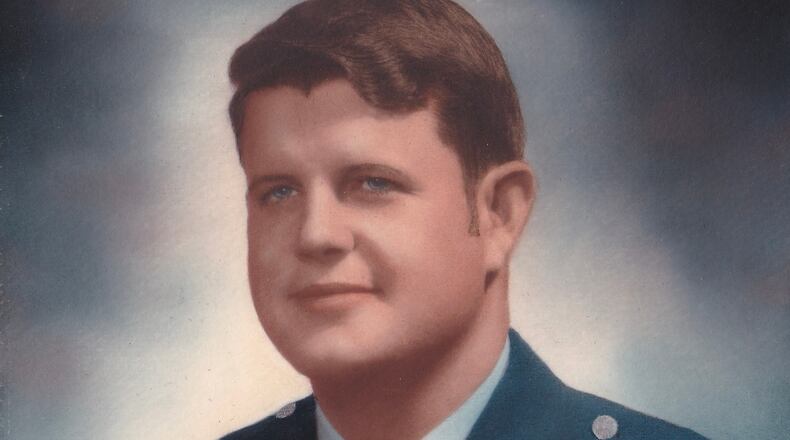Al Nixon once vowed he’d never wear a uniform. Despite the military legacy of his father and two brothers, Nixon declared, “I don’t want anything to do with the military.”
But fate had other plans. Initially classified by the military as F-4 — unfit for service due to high blood pressure — Nixon thought he’d dodged the draft. A second physical, however, cleared him for duty.
He volunteered for the U.S. Air Force rather than be drafted by the Army, starting a military career that would span eight years and earn him numerous honors, including two Distinguished Flying Crosses.
Credit: Photo courtesy of the Nixon family
Credit: Photo courtesy of the Nixon family
“He volunteered for two tours of duty because he was so dedicated to his compatriots, and he knew the people on the ground had it worse than he did,” said his stepson, Scot J. Mann, a theater professor at Mercer University in Macon. “He tried for a third tour, but they made him stop. They said, ‘No, you’ve done enough.’”
Albert “Al” Mathews Nixon, a decorated Vietnam veteran, business owner and community volunteer died Sept. 15 at his Flowery Branch home, surrounded by family. He was 82.
A native of Atlanta, Nixon’s life intersected with two of the city’s landmarks. He was born next door to the Swan House, a 1920s mansion now part of the Atlanta History Center, and later worked for the company that built the fountains at Centennial Olympic Park.
His family moved to Thomaston, near Macon, during his school years. Nixon’s physical abilities shined as he lettered in track, basketball, football, and wrestling in high school and at Darlington Prep School in Rome, earning him a scholarship to The Citadel, a military college in South Carolina, in 1961.
After graduating, Nixon briefly worked as a bridge engineer for the Georgia Department of Transportation. But his second military physical changed everything. Army staff warned him to expect a draft notice. Nixon preempted that by joining the Air Force, where he learned to fly amid the intense and controversial Vietnam War.
In Vietnam, Nixon flew 63 high-risk close-air missions with the renowned Wolf F.A.C. unit, which suffered heavy losses. His experiences haunted him.
“We’d have a cease-fire for three to four days, and then we’d be back to dropping bombs,” he recalled in a 2018 oral history given at the Atlanta History Center. “That went on and on and on.”
For his gallantry in facing enemy aircraft, surface-to-air missiles and anti-aircraft guns over the hotly defended Red River Valley, Nixon earned a lifetime membership in the Red River Valley Fighter Pilot’s Association. Twice, in 1970 and 1972, the Air Force awarded him the Distinguished Flying Cross, the nation’s highest award for extraordinary aerial achievement.
After his honorable discharge, Nixon celebrated his return stateside by buzzing his parents’ Thomaston home in his plane on Thanksgiving morning — a stunt that he thought might earn him a reprimand but didn’t.
Like many Vietnam veterans, Nixon was reluctant to discuss his war experiences. But when he did, humor softened even the most harrowing tales.
“He would make you laugh while recounting the worst moments like bullets piercing his cockpit,” Mann said. “That’s the way he approached everything.”
After the war, Nixon became a beloved figure in Atlanta’s social scene, earning the moniker “the mayor of Buckhead” for his charisma and wit. When conversations stalled, he’d pull out a joke book to get everyone laughing, Mann said.
Nixon’s postwar career began in aircraft sales, which seemed a natural fit. After eight years, he pivoted to a company that built water fountains. He left that job and started his own fountain company, which he ran until 2017.
Nixon’s commitment to service never waned. He volunteered with the Coast Guard Auxiliary on search-and-rescue missions and helped pull drowned bodies from Lake Lanier. He helped provide disaster relief through the American Red Cross and used his piloting skills for Angel Flight, taking people with medical needs to locations where help was available. After 9/11, his top-secret security clearance was updated, and he flew surveillance missions along Georgia’s coast. The only “incident” he reported was the safe retrieval of a wayward surfer.
Nixon’s family lineage was steeped in service. His family’s Thomaston mill produced uniforms for World War I and World War II soldiers, and during the Great Depression, they launched their own jobs program, of sorts, hiring local people to build roads and improve their property. That spirit of giving was passed down to him by his grandfather, Mann said.
“His caring for people other than himself was just a big trademark of Al Nixon,” he said.
Nixon is survived by his wife of 32 years, Patricia Nixon; his stepson, Scot J. Mann; and five grandchildren.
A memorial service was held Thursday at Patterson funeral home in Brookhaven. A graveside service with military honors was held at the family plot in Thomaston Georgia on Friday.
Hear Nixon’s account of his war experiences and his life in this oral history from the Atlanta Historical Society: Federated Search | Atlanta History Center
About the Author
Keep Reading
The Latest
Featured




